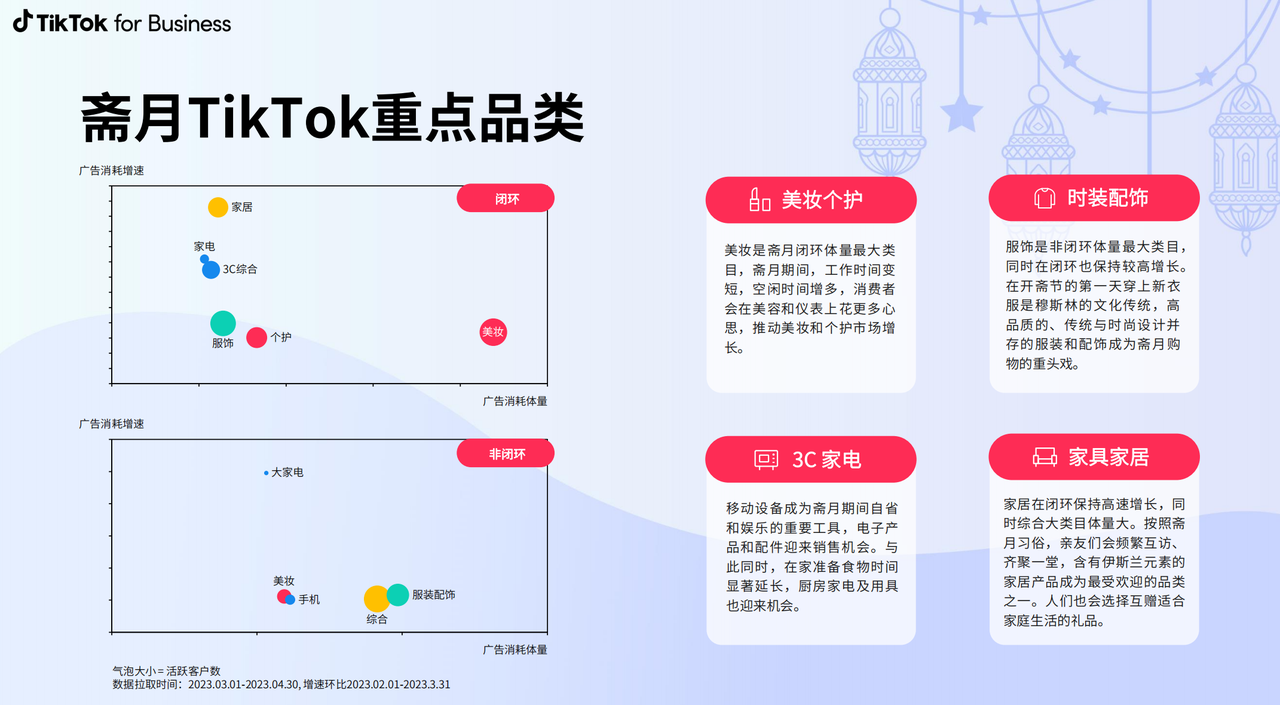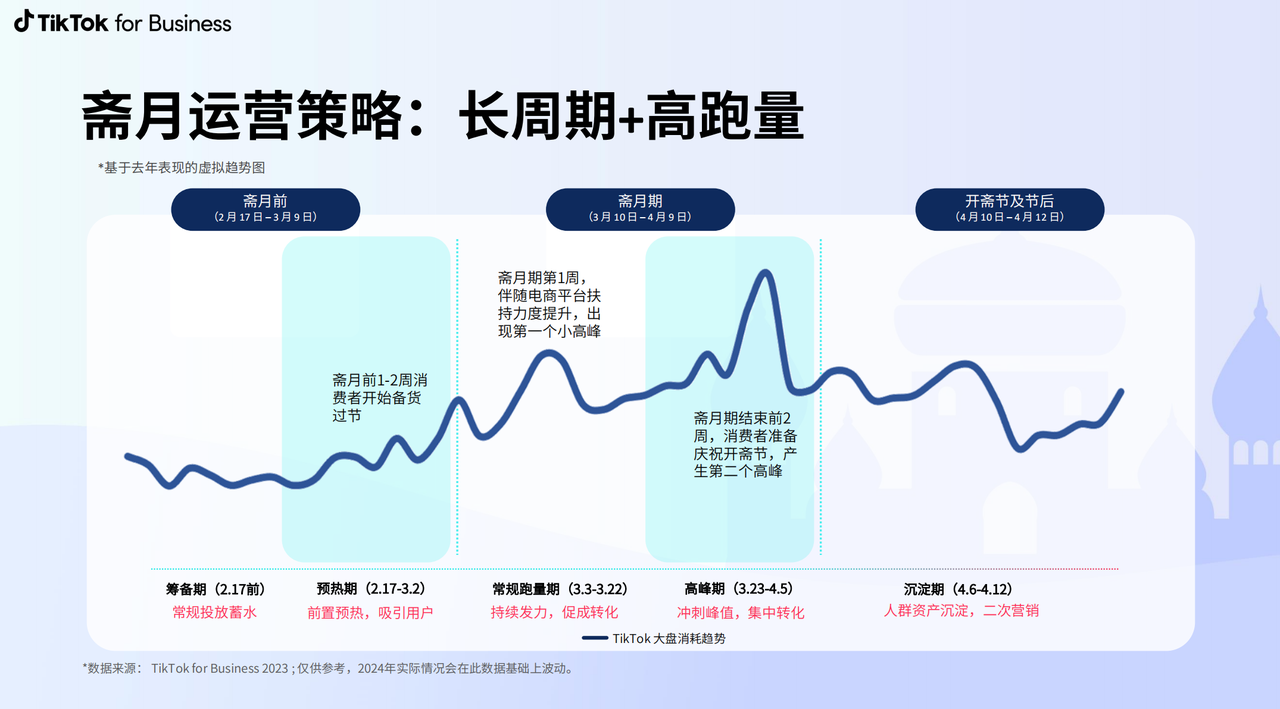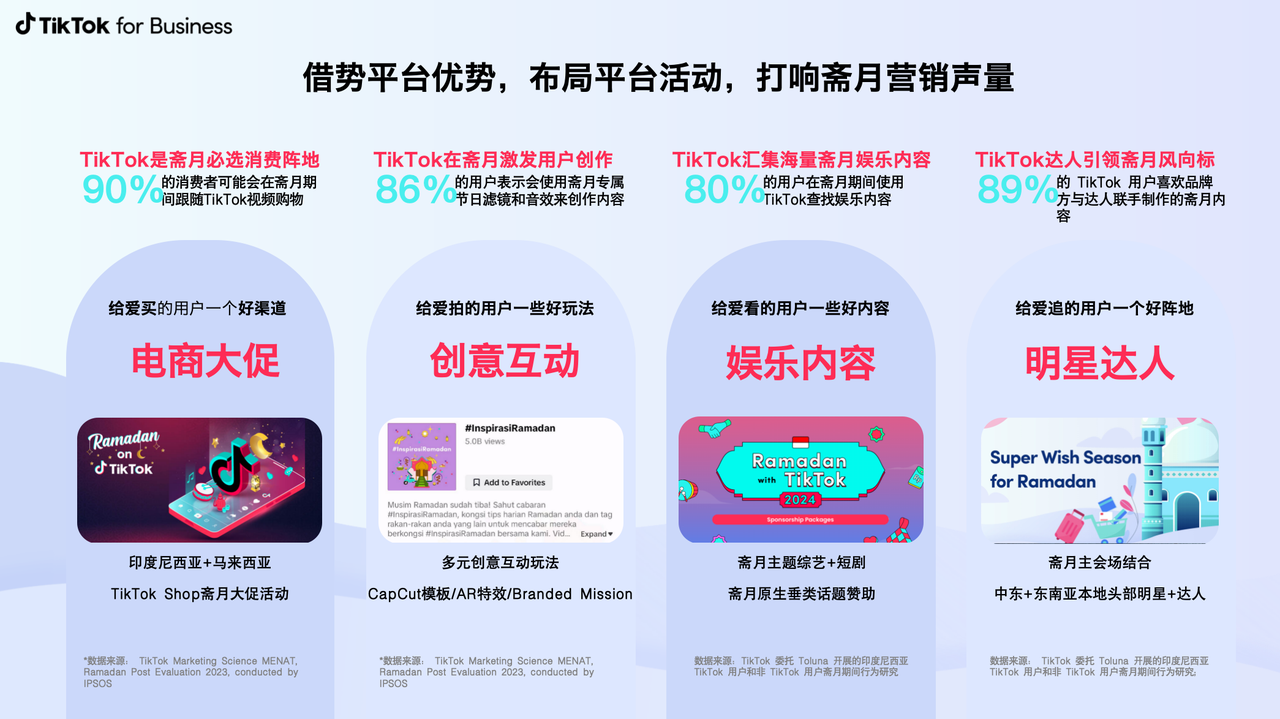Revealing Ramadan marketing tips: global brands join hands with TikTok to create holiday bestsellers
[Ebrun Original] Social media influencer Ria shared a striking video on her TikTok account.
At the beginning of the video, Ria, with her iconic smile, faced the camera and said, "I have prepared a magical mouthwash for Ramadan. It not only keeps your breath fresh, but also makes your smile more radiant."
Then, Ria began her challenge. She cleverly used a TikTok effect to simulate an instant teeth whitening effect. In the video, Ria, in a fun way, danced while rinsing her mouth, with cheerful, pleasant background music, which was very appealing.
After completing the challenge, Ria showed her teeth again, which looked brighter and whiter in stark contrast to before. She said to the camera, "See! This is the magic of Metoo! During Ramadan, we all want to look our best."
The video stemmed from a TikTok influencer challenge organized by Metoo for Ramadan in 2023, and local celebrities and top influencers were invited to participate. Fans enthusiastically discussed it in the comments, expressing their desire to try this mouthwash, inquiring about the purchase link. Many people even imitated Ria's challenge video and joined the challenge. Ultimately, the challenge garnered over 20 billion video views during Ramadan.
Due to the increased demand for oral hygiene after breaking the fast in the evenings during Ramadan, mouthwash sales during this period surged to 5 to 10 times higher than usual.
The video challenge by the global brand Metoo mouthwash was able to attract numerous eyeballs and set off a buying spree precisely by identifying the business opportunities behind the Ramadan season. During this special moment, short video social platforms have also become an important link connecting consumers with products.
Ramadan, a major Islamic event, is like the Chinese Lunar New Year, an important time for family and friends to gather and spend time together. As Ramadan approaches, consumers prepare for the spiritual cleansing of the month and their online shopping carts quietly fill up. From home decor to holiday food, from gifts for relatives and friends to personal indulgence, it has driven a surge in online consumption demands, marking the beginning of a peaceful consumption battle with no gunpowder.
It is understood that this year's Ramadan will start on March 10 and end on April 9, followed by the celebration of Eid al-Fitr on April 10. Even before Ramadan officially arrives, shoppers from the Middle East, Indonesia, Malaysia, and other places have been making early purchases online to prepare for the lifestyle during Ramadan.
As of now, the #Ramadan tag on TikTok has accumulated more than 74 billion views, which means that on average, each Muslim user has watched it approximately 40 times. Observing global viewing trends related to the #Ramadan tag on TikTok in 2023, there has been a sharp increase in viewing volume from March to April, indicating the strong appeal of Ramadan-related content on the TikTok platform, and this popularity is expanding year by year. Compared to 2022, the annual viewing rate of that tag increased to 113%, indicating that the popularity and influence of Ramadan topics on the TikTok platform is still growing.
01
A fusion journey of culture and consumption.
Ramadan consumer online shopping list.
As a celebration for nearly a quarter of the world's population, Ramadan in the Middle East, Indonesia, Malaysia, and other places is particularly grand. It is not only a pious religious journey, but also a showcase of the fusion of culture and consumption behavior.
In the Middle East, the arrival of Ramadan signifies that markets and stores will introduce a series of special goods, ranging from high-end Islamic clothing to exquisite lighting, to cater to the celebratory atmosphere during the breaking of the fast at night. Especially during Ramadan, iconic Middle Eastern desserts such as Maamoul and Kunafa become indispensable delicacies for family gatherings, and DIY baking kits for these desserts see corresponding sales surges on e-commerce platforms.
In Indonesia, the world's largest Muslim country, Ramadan consumption exhibits localized characteristics. Sales of traditional attire such as Sarong, Kebaya, Islamic books, and prayer items soar. Additionally, popular starters for breaking the fast and special pastries sell well on e-commerce platforms, showcasing Indonesia's unique Ramadan flavors.
During Ramadan in Malaysia, the market is full of various Ramadan markets (Bazaar Ramadan) that sell all kinds of food, as well as handicrafts and traditional attire. E-commerce platforms attract consumers by introducing "Ramadan specials" that include special prices for halal meals to exquisite Malay clothing, meeting the demand for holiday gifts and personal goods.

On TikTok, the Ramadan consumer frenzy notably centers on core categories such as beauty and personal care products, fashion accessories, 3C electronic products, and home decor. Specific data reveal the popularity of this trend: the #Eid clothing and #bajulebaran topics have accumulated an astonishing total view count of 1.8 billion; closely following are the #Ramadan recipes and #ramadanrecipes topics related to Ramadan food, with accumulated view counts of 170 million. In addition, tags related to beauty and personal care, and home decor such as #Eid makeup and #ramadandecor have also accumulated 18 and 20 million views, respectively.
Facing this unique period of heightened consumption, overseas merchants and global brands need to delve deeper to refine their marketing strategies that precisely match the cultural characteristics and consumption habits of different regions. Moreover, understanding the local cultural consumer philosophy can help enhance their brand image and strengthen their connection with consumers. For example, by launching products that adhere to cultural characteristics, showcasing respect and understanding of the local culture, and participating in local online/offline community activities to enhance interaction and connection with consumers.
02
Ramadan business strategies:
Precise marketing, layout of critical periods.
"During Ramadan, fast shipping has become one of the important factors for users to choose e-commerce platforms because each day during Ramadan is precious, consumers hope to receive the gifts for their families as quickly as possible. At the same time, price sensitivity also increases as the festive atmosphere intensifies, and users tend to look for products with high cost performance." Allen, responsible for the Middle Eastern market for a beauty brand aiming at global markets, shared.
Preparations often start a month or even several months in advance, which is reflected not only in personal consumer aspects but also in businesses' inventory management and marketing strategies. This year's Ramadan starts from March 10 and lasts for about 30 days until April 9. For overseas businesses, how to accurately grasp the marketing rhythm during this special period is undoubtedly challenging. They need to flexibly readjust their strategies while respecting local cultures and customs to attract more consumers, providing them with an unforgettable shopping experience during this special festival.

In TikTok for Business's "2024 Ramadan Marketing Guide" (related materials can be accessed from the TikTok for Business Chinese official website), corresponding time planning suggestions are given:
Preparation + Preheating period (February 17 to March 2): Before Ramadan arrives, businesses kick off preheating activities to garner user attention with Ramadan-related content, while planning relevant marketing activities for quick market captures when the festivity arrives.
Regular volume period (March 3 to March 22): During this period, demand for Ramadan-related products begins to increase. Businesses step up marketing efforts by releasing promotions and product information related to Ramadan, such as special offers, limited-time discounts, etc., to stimulate purchasing intentions of users.
Peak period (March 23 to April 5): After Ramadan begins, user activity and buying demand reach their peak. Businesses typically launch key products and special offers during this time, intensify social media ad placements, and collaborate with numerous internet celebrities to further amplify their marketing efforts.
Sedimentation period (April 6 to April 12): In the final week of Ramadan, businesses further increase promotional activities to ensure they take advantage of the last consumer peak during Ramadan. At the same time, this stage also begins planning post-Ramadan marketing activities to maintain user purchasing enthusiasm and brand attention.
Fashion accessory brand Ounass provides a great example of a well-deployed Ramadan marketing strategy. In the week before Ramadan, Ounass launched a distinctive "Miracle Week" marketing campaign. Through close collaboration with TikTok, the brand intensified ad placements during the peak period and worked with numerous internet celebrities, driving marketing efforts to a climax. To avoid dwindling momentum after the campaign, Ounass cleverly divided "Miracle Week" into two stages, attracting new customers while reactivating existing ones.
Throughout Ramadan, Ounass successfully promoted a 103% increase in GMV and a 99% increase in purchases through diverse ad formats and creative content that closely aligned with fashion needs. This success case not only demonstrates Ounass's keen market insights and precise marketing capabilities, but also underscores TikTok's powerful marketing potential.
For businesses, precise planning and flexible strategy adjustments are the keys to success during this special festival. By deeply exploring cultural characteristics and consumption habits in different regions, businesses can precisely tailor product and selection strategies that resonate with Ramadan's atmosphere, attracting more consumers.
3
A new chapter in Ramadan marketing:
Join hands with TikTok to create an immersive festival experience
Since Ramadan is a rare marketing opportunity for businesses, excelling in content marketing on platforms such as TikTok is particularly important during this special period. This not only aligns with the characteristics of short-video platforms, but also better meets user expectations, directly driving sales conversions. Understanding local culture, extensive collaboration with celebrities, and creating entertaining content make this easier to achieve.
"The key to doing business on TikTok lies in creating high-quality content," succinctly expressed by Will, an overseas seller of 3C accessories. High-quality content isn't just product showcases or direct sales promotions, but requires a deep understanding and respect for local culture, accurately capturing consumer needs and preferences. This sensitivity is particularly crucial during Ramadan.
For overseas sellers, collaborating with local influencers and producing high-quality content is a critical step in excelling in TikTok marketing. Andy, a top seller in the home category, points out, "It requires in-depth collaboration with influencers to create entertaining content for achieving more organic conversions."

During Ramadan, businesses can leverage TikTok's advantages and participate in various creative interactions. For example, creating entertaining, high-viewing-rate content using CapCut templates, AR effects, and Branded Missions. Additionally, sponsoring native Ramadan topics, variety shows, and short dramas is an effective way to collectively create more content in line with the festival's atmosphere.
Collaborating with celebrity influencers is a crucial means to steer the Ramadan trend. The content marketing campaign launched by TikTok in the Middle East region sponsored native topics on Ramadan such as food, fashion, beauty, and games, and initiated interactive tasks for users, and specially launched a super influencers show created by heads of various fields. Deep collaboration with celebrity influencers not only enhances brand exposure but also strengthens consumers' trust and affinity toward the brand.
In specific cases, tiket.com successfully integrated brand and non-branded content, conveyed key brand information by sponsoring the heavyweight event #HiburanSeruRamadan (Entertaining Ramadan) on TikTok. They also participated in TikTok's Ramadan season sponsorship package, collaborated with creators, and placed high-quality contract and bid ads, achieving large-scale exposure.

Another noteworthy case is Frestea. This Coca-Cola sub-brand of ready-to-drink tea achieved remarkable results on TikTok through integrated online and offline event APIs, realizing amazing effects. They used TikTok's Spark Ads to construct audiences, measure effects, and attribute, while simultaneously optimizing online APIs focused on core business. Ultimately, they obtained outstanding results of 66 million impressions, 64% conversion rate, and 5.58 billion samples exchanged.
From Metoo's mouthwash challenge to Ounass's "Miracle Week," and then to the successful cases of tiket.com and Frestea, we see the boundless possibilities of content marketing during Ramadan. These successful cases not only showcase businesses' keen market insights and precise marketing capabilities but also highlight the enormous potential of TikTok's marketing and e-commerce attributes. For businesses, the end of Ramadan does not mean the end of marketing. They will continue to explore new marketing strategies and creative content on TikTok, preparing for the next festival and the next challenge. In this ever-changing and opportunistic market, only through continuous innovation and advancement can more business opportunities be seized, and more consumers be won over.
[Copyright Notice] Ebrun advocates respecting and protecting intellectual property rights. Without permission, no one is allowed to copy, reproduce, or use the content of this website in any other way. If any copyright issues are found in the articles on this website, please provide copyright questions, identification, proof of copyright, contact information, etc. and send an email to run@ebrun.com. We will communicate and handle it in a timely manner.
